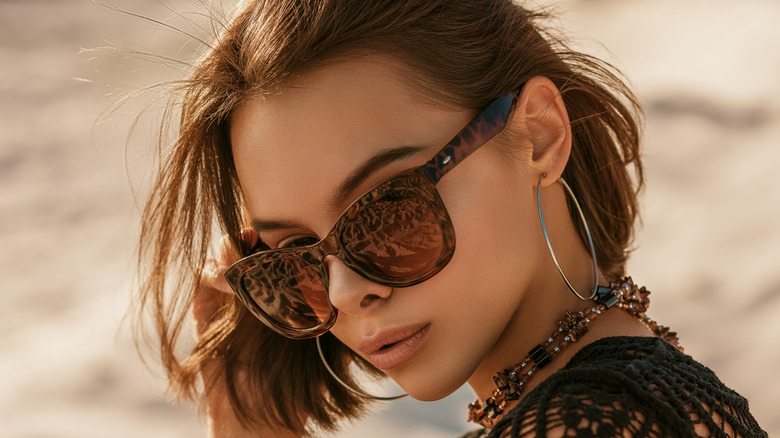What Is The Difference Between Polarized And UV-Blocking Sunglasses?
Sunglasses are a staple in everyone's accessory rotation. Not only do sunglasses make an outfit, but they also protect your eyes from the sun throughout the day. No matter how long you're outside, getting protection for your eyes is of utmost importance.
One of the main types of rays the sun lets off is called Ultraviolet A (or UVA), which can be incredibly damaging to the eyes. In fact, UVA rays are known to damage a part of your eye called the macula, which helps you see clearly. The other type of ray emitted from the sun — Ultraviolet B (or UVB) — is known to damage two different parts in the front of the eye: the cornea and lens (via WebMD).
Therefore, wearing sunglasses is important not only for style but also for protection and making sure your eyes stay strong and clear. However, there are two different kinds of sunglass lenses on the market, and it's best to know about them both.
Should you opt for polarized or UV-blocking glasses?
The two main types of lenses that come in sunglasses are UV-blocking and polarized. While many people think that sunglasses are all made the same, the two types of lenses differ both in protection and strength.
Lenses that are UV-blocking protect your eyes from both UVA and UVB rays (via VSP). This is incredibly important because the rays can damage your eye beyond repair if you have too much exposure. In addition, UV-blocking lenses protect your face and eyes from skin cancer, as the skin around your eyes is more likely to be at risk for carcinoma (via Swanwick). Polarized lenses, on the other hand, don't provide UV protection. However, they do help with reflection and effectively eliminate glare (via Swanwick). This can help people who have migraines and headaches, and it can also help eliminate eye strain.
While both polarized lenses and UV-blocking lenses have benefits on their own, they work better when they're combined (via VSP). Many people don't want to splurge to spend the extra money for both, but in the end, you need the combo to protect your eyes and keep them safe.

